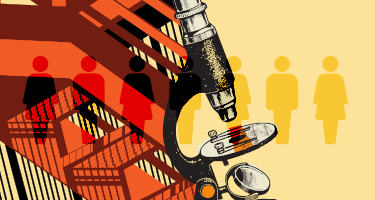How often do 170 lawyers publicly agree on anything?
When that number of in-house counsel signed on to a public letter calling for more gender and racial diversity in the partnership ranks of law firms, then, attorneys noticed. The letter, published on a general counsel group page on LinkedIn in January of this year, brought the simmering issue of equitable representation in partnerships to a full boil.
Long before 2019, though, many female lawyers developed their own way of breaking through the law-firm glass ceiling: Many went into government service and gained valuable, highly marketable skills. That experience in hand, they then landed partnerships at major law firms.
The Root of the Problem
While the discouraging lack of gender parity has long been a known fact, a study by Stephen Turban, Laura Freeman, and Ben Waber, published in Harvard Business Review in October 2017, tried to pinpoint the cause. Researchers gathered multiple types of data about the employees in one office of a multi-national corporation. The researchers selected 100 employees (50 women, 50 men) spread across seniority levels and with varying lengths of service at the company. Researchers gave the participants sociometric badges, which looked like the ID badges worn by all employees, but they recorded communication patterns by using sensors that measured movement, proximity to other badges, and speech (volume and tone of voice). These badges could tell the researchers who talked with whom, where people communicated, and who dominated conversations. What did they discover?
- There were almost no perceptible differences in the behavior of men and women.
- Work patterns in online behavior, concentrated work, and face-to-face conversations were the same regardless of gender.
Researchers also found that men and women received statistically identical scores in performance evaluations. This held true for women at each level of seniority.
Despite this data, “women weren’t advancing,” the researchers said, “and men were.” Although the study took place in a large corporate environment, the results sound hauntingly familiar to women who have voiced similar complaints for decades about law firms.
Find Another Way
Erica Williams, a partner at Kirkland & Ellis in Washington, D.C., says women need to be clear about the experiences they want to have throughout their career. Having a set schedule or plan isn’t as important. Williams had been an associate for a few years when she decided she needed to look outside corporate law to get the trial experience she sought. She realized, too, that the structure at the typical firm erected significant barriers to gaining trial experience. “If a client is paying high rates,” she says, “they want a partner to try the case.”
Ultimately, in 2004, Williams landed at the Securities and Exchange Commission as assistant chief litigation counsel, though she had no prior experience with securities. She was surprised by how much autonomy she had as trial counsel: “I was able to do everything: first chair trials, take depositions, argue motions.” She stayed with the SEC in a variety of roles until 2015, when she got a call asking her to move to the White House as associate counsel for finance and economic policies.
Katya Jestin, partner at Jenner and Block in New York, knew from an early age that she wanted to be a criminal lawyer, inspired largely by Nancy Drew stories. As she got closer to law school, she refined her dream: She wanted to work on organized-crime cases.
After a stint at a New York firm, she realized she’d need much more trial experience. Given that that was hard to come by in most firms, she initially went to work at the District Attorney’s office in New York, then to the U.S. Attorney’s office in the Eastern District of New York. As a prosecutor, she tried cases regularly. Living her dream, in fact, she successfully prosecuted the leadership of three of the five Cosa Nostra crime families, and was co-counsel in the RICO conviction of Gambino boss Peter Gotti in 2003. “It was,” she says, “way better than Nancy Drew got to do.”
Find a Guide
Jennifer Saulino, partner at Covington and Burling in Washington, D.C., emphasized the importance of women finding sponsors early in their legal career.
Saulino started her career at Covington. When she first considered leaving for a government position, she reached out to Lanny Breuer, for whom she’d worked before he was tapped to lead the Department of Justice Criminal Division in 2009. His encouragement and guidance were key, she says.
Beth Brinkmann, a Covington partner also in Washington, spent most of her pre-Covington career in government service. A former clerk for Justice Harry Blackmun, she was a natural to argue for the government as assistant counsel in the office of the Solicitor General, and later as deputy assistant attorney general for the Civil Division of the Justice Department. “Having that foundation as a Supreme Court advocate was unique,” she says, noting that she wouldn’t have the same depth of experience had she remained in private practice her whole career.
Jestin, too, points out how important professional relationships have been to her. She decided to leave the government after discussing it with a good friend from the U.S. Attorney’s office. The fact that a former AUSA she knew had gone to Jenner and Block and was happy there made Jestin far more comfortable about making the same leap. Look who’s in leadership positions in a given firm as well, Jestin and Brinkmann emphasize; it’s important to see women occupying some of them.
Sarah Fitts, a partner at Schiff Hardin in New York who mentors young lawyers, observes that the “really important metric to look at is how many women over age 50 are at the firm. That will tell you what its culture is.” If there aren’t many female partners of that age, it’s a sure sign the firm was late to bring women into the partnership ranks—or bad at retaining them.
Client Pressure Can Make a Difference
The government-lawyer career path alone will not solve gender inequity in law firms, partly because there just aren’t as many opportunities for government work outside of a few major cities. Moreover, some women are simply uninterested in that option.
Regardless, though, there’s plenty of room for improvement. So far, the Trump administration has appointed eight women as U.S. Attorneys. Over Barack Obama’s two terms, 24 women served as U.S. Attorneys, out of 109 overall. “I’m worried that the lack of government appointments will hit women in the profession hard,” Fitts says. “If fewer women get that government experience now, 10 years from now there will be fewer women with that type of experience available to take leadership roles at firms and in the profession generally.”
Jestin says the in-house counsel letter could certainly pressure law firms to improve the diversity of their teams and partnership ranks. As it stands, she adds, many firms are plagued by unconscious bias, and “the detritus of the past needs to get shaken out” of their corporate cultures. “If [diversifying] isn’t a habit, it won’t happen.”
When Covington’s Brinkmann joined the SG’s office in 1993, she was just the second woman who had ever argued before the Supreme Court for the Appellate section; the total team comprised about 20 attorneys. Then-Solicitor General Drew Days asked Brinkmann to help boost diversity in the SG’s office, and among her tactics were expanding their recruiting pool by more widely advertising openings, and interviewing at more law schools. By the time she left, five more women had joined the team.
Similarly, Brinkmann maintains, firms need to make sure that the pools they draw from for assignments and partnerships are fair: “It’s important that [partners] aren’t going to the same attorneys over and over.” Kirkland’s Erica Williams points out that partners tend to sponsor people who are like them. To bolster diversity, she says, they need to sponsor those “who don’t look like them.” Sponsorships need to happen earlier, too. Clients can be instrumental in shaping more-diverse teams, she adds. “Clients have to demand [diversity] when reviewing bills” and by asking why pitches for business don’t include a varied group.
Years ago, women were often told that they couldn’t be given certain assignments because clients didn’t have confidence in them. Now the tables have turned, and clients are demanding teams staffed with women and minorities. It falls to forward-thinking law firms to provide them.
-----------
Jennifer Alvey is a recovering lawyer and unrepentant coffee addict who stopped practicing before smartphones became ubiquitous. She has written for and edited numerous legal publications since 1999. In addition to writing and editing, she coaches lawyers on finding more satisfying careers. She can be reached at jalvey@jenniferalvey.com, or via her blog, leavinglaw.wordpress.com.
























